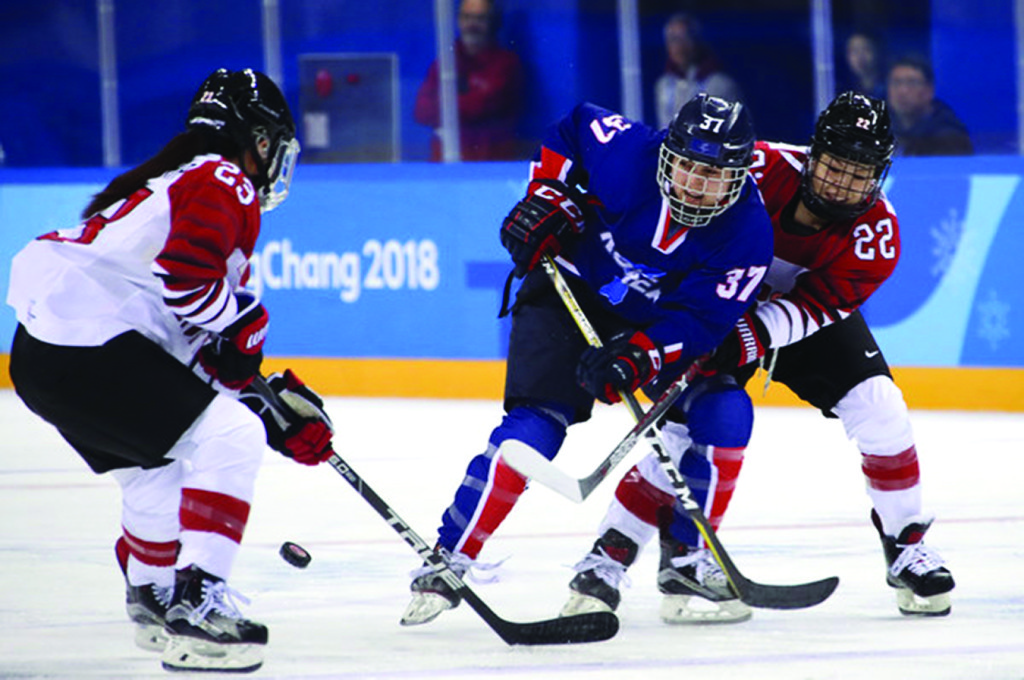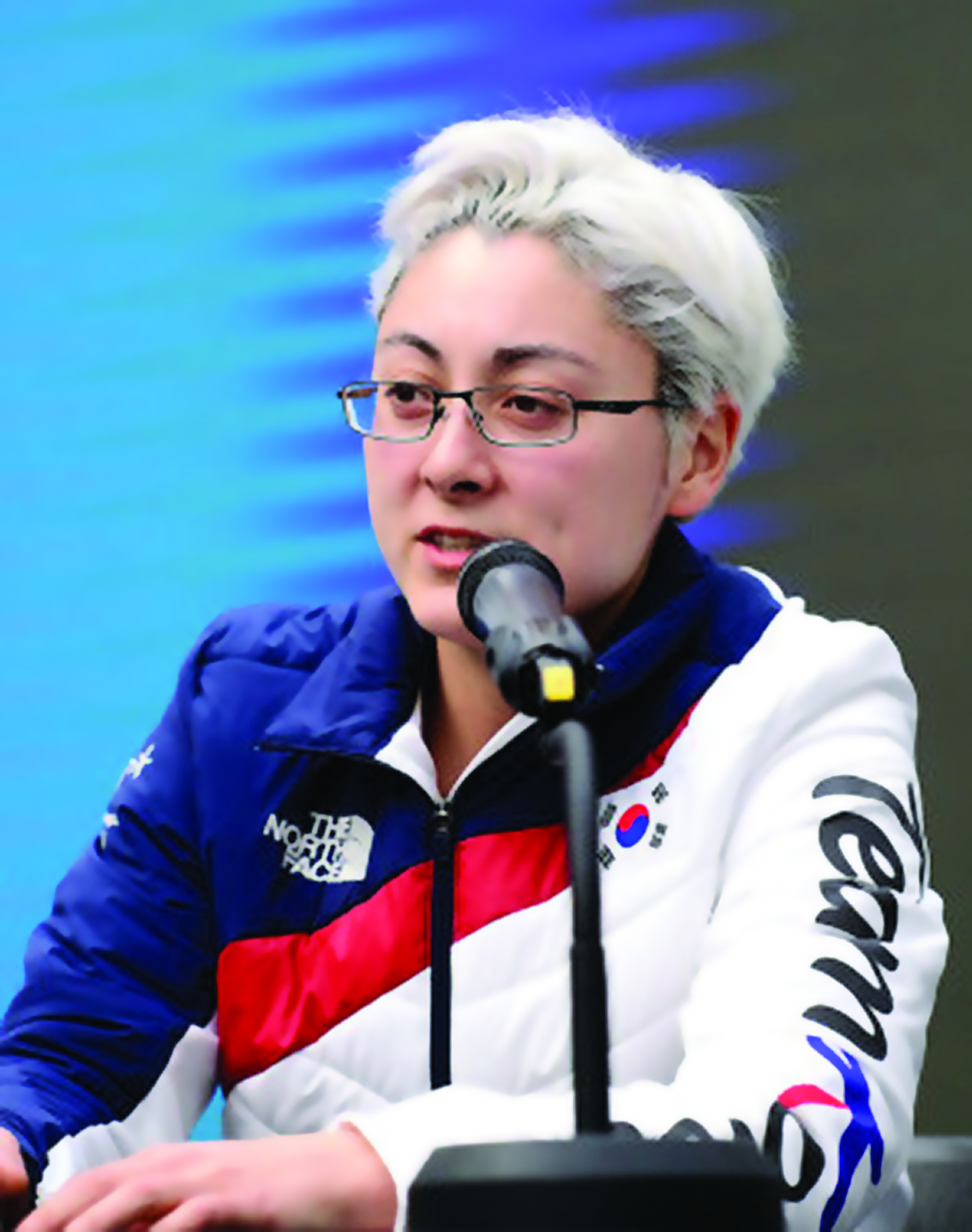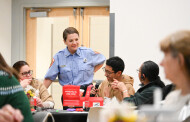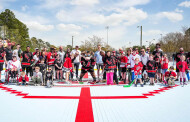 A native of Apex, Randi played hockey growing up in the Triangle before heading off to Harvard University in 2006 to earn a degree in human evolutionary biology. She was a forward on the Harvard team and thought her puck-passing days were over once she graduated in 2010. She returned to North Carolina to attend graduate school at Duke for her doctorate degree in evolutionary anthropology, but work on her dissertation was interrupted in 2014.
A native of Apex, Randi played hockey growing up in the Triangle before heading off to Harvard University in 2006 to earn a degree in human evolutionary biology. She was a forward on the Harvard team and thought her puck-passing days were over once she graduated in 2010. She returned to North Carolina to attend graduate school at Duke for her doctorate degree in evolutionary anthropology, but work on her dissertation was interrupted in 2014.
The Korean Ice Hockey Association was contacting players of Korean ethnicity from all around the world in anticipation of the 2018 Winter Olympic Games and they emailed Randi, whose mother is Korean. The team would represent the host nation of South Korea. Randi agreed to play and began training, eventually moving to South Korea in 2017 to train full-time.
Just weeks before the Opening Ceremonies in PyeongChang, the women’s Olympic hockey tournament was suddenly illuminated under an international spotlight. The governments of both South and North Korea were creating a Unified Korea team for the first time in history and a dozen North Korean players joined Griffin and her teammates.
It was a surprise move that wasn’t without controversy, but the athletes came together in South Korea despite speaking different languages, being housed separately, and never having skated together.
All eyes were on the Korean team, including those of the leaders of both nations, and while there was much to celebrate from a unity and camaraderie standpoint, the final scores weren’t as joy-filled. Teams from Switzerland and Sweden handed Korea shutout losses before the unified team took the ice for a rivalry game against Japan.
It was in the second period that Apex’s Olympic hero made a second contribution to hockey history. Randi took what she considered to be a sloppy shot—and scored! It was the first goal in Winter Olympics record books for any unified Korean ice hockey team.
The Korean team may not have tallied winning scores, but for this unique group of skaters the Winter Games in PyeongChang were a gold-medal experience. For Randi herself, it was an experience topped by the realization that the puck she scored with against Japan is going to exist indefinitely in the International Ice Hockey Federation’s Hall of Fame in Toronto, Canada—with her name on it.
We caught up with Randi Griffin for a quick Q&A while she enjoys some much-needed rest.
Amy Iori: What are your thoughts on having represented the Korean women’s team in light of the cohesion and success of the U.S. women’s team?
Randi Griffin: “I think Team USA and Team Korea represented two completely different and beautiful sides of women’s hockey at the Olympics, and both teams were successful in their own way. Team USA represented the peak of elitism and excellence in women’s ice hockey, while Team Korea represented a very pure and humble passion for the game, the kind that people playing on ponds and in recreational leagues all over the world can relate to. For each of the women on Team USA, just being selected from among thousands of elite athletes was an incredible individual accomplishment and essentially a guarantee of a silver or gold medal. For Team USA, that gold medal is the reward for several decades of USA Hockey supporting the sport and developing these incredible players.
On the other hand, Team Korea is a grass roots women’s hockey program in a small country that does not even have enough players for an all-female league. Our core group of Korean players started out as a group of friends that discovered this weird game and just loved to play together—it was a group of friends who loved hockey before it was an Olympic team. We aren’t world-class athletes and we knew we weren’t going to win any medals, but we love this game, and we played our hearts out because we wanted to share that with Korea and inspire more girls to play.”
Amy: What’s next for you both on the ice and for your
doctoral studies?
Randi: “Honestly, I don’t know yet. I’m expecting to finish my PhD in May, but I don’t have a job lined up yet. I’ve been so focused on this hockey season and my dissertation that I haven’t had much time to dive into a job search. I also don’t know what the future of the Korean hockey team is—all of my teammates and I are still waiting to see what plans, if any, KIHA has for our future. I know some of the girls are joining Canadian universities so they can keep playing and studying at the same time. Others may be forced to retire so they can focus on school and careers.
I would like to keep playing as long as I am useful to the team, but I think it will depend on how much financial support the team has, how many players are returning, and whether I can balance having a real job and staying in good enough shape to play at this level. If our core group of players can’t stick together, I’ll probably retire as well, and then I will definitely get back into coaching.”
Amy: Can you describe a favorite moment of your Olympic experience?
Randi: “One of my favorite moments came at the end of our last game at the Olympics, a 6-1 loss to Sweden. In some ways, it felt like a failure to leave the Olympics without winning a game, but the sold-out crowd gave our team a standing ovation as we got off the ice, and in that moment, they showed us that they still supported us and it wasn’t all about winning. After that game, I also received a lot of messages from Korean supporters just saying that they were proud of us and that they still love our team. I wasn’t expecting that, but it was really cool.”
Amy: Now that the Winter Olympics have ended, how are you spending your time off from training and competing?
Randi: “Our coaches gave us two weeks off after the Olympics, and I’m using that time to relax and catch up on some writing for my dissertation. But after these two weeks, I have to get back to Korea for training, because our season actually isn’t finished yet! We are competing in the World Championships in mid-April, and those games are very important to our team because they influence our international ranking, and thus our prospects for qualifying for future Olympics. After the Olympics, our ranking moved from 22nd to 17th in the world. This World Championship tournament is a chance for us to move as high as 12th. Since 10 teams will qualify for Beijing, that would make us real contenders.”
Amy: Any additional thoughts for your hometown readers in Apex?
Randi: “I’ll always be grateful to the boys who both accepted and challenged me, and the local youth hockey coaches who encouraged me to play and love the game at a time when not many girls played hockey in NC. The Triangle hockey community has grown a lot since the 1990s when I got started, and it’s especially awesome to see that there are a lot more girls playing now. Although the community has expanded, there are still so many familiar faces every time I walk into one of the Triangle-area rinks, and it reminds me of what a great community we have. The best part is when I see people I grew up playing with, but now they are giving back to the game as referees, coaches, or even hockey parents. That’s what it’s all about.”








